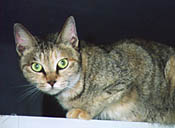 Cats have a particular disadvantage in Korea. If one were to believe all of what is said about cats in Korean media and popular wisdom, one might also assume that cats live to deceive and frighten people while spreading disease.
Cats have a particular disadvantage in Korea. If one were to believe all of what is said about cats in Korean media and popular wisdom, one might also assume that cats live to deceive and frighten people while spreading disease.
Although some dogs, especially small dogs, are kept as pets, it is very uncommon for Koreans to raise cats with similar affection. High-quality cat products are available only through U.S. Military bases, which are not accessible by Korean nationals. Therefore, the cat food and litter one might see at a typical supermarket or pet store are scarce in Korea. Only recently has Korea begin selling cat food, but with high prices and of questionable quality. Vaccinations and common veterinary services for cats are extremely rare.
Like dogs, cats are slaughtered for human consumption because of their mythical medical properties. Vendors boil cats with herbs in large pressure cookers to make goyangi soju, a thick tonic believed to cure rheumatism, arthritis, and neuralgia. Horrifically, some who produce this tonic cook the cats while they’re still alive or beat them to death in sacks. And, like dog meat, goyangi soju has been proven not to afford the health benefits its sellers advertise.
Clearly, the Korean public’s negative perception of cats makes it possible for the cruel practice of cat slaughter to go on. IAKA works to educate the public that cats are affectionate, clean, and self-sufficient—the ideal indoor pet for South Korea’s densely populated urban areas. . More resources, like veterinary care for cats, must move in these neighborhoods so that Koreans who want to adopt a cat have easily accessible services.
These photographs show how much cats suffer from antiquated myths passed down generation by generation. They are not suitable for all audiences. Viewer discretion is advised.




